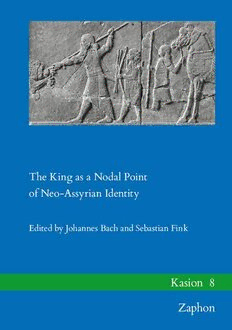
The King As a Nodal Point of Neo-Assyrian Identity (Kasion, 8) PDF
299 Pages·2022·8.192 MB·English
Most books are stored in the elastic cloud where traffic is expensive. For this reason, we have a limit on daily download.
Preview The King As a Nodal Point of Neo-Assyrian Identity (Kasion, 8)
Description:
Over the course of the last decade, the field of Ancient Near Eastern Studies has seen an uptick in studies devoted to the research of identity building in various cuneiform cultures. Despite these contributions the construct network character of identities remains understudied for the Ancient Near East. The conference "The King as a Nodal Point of Neo-Assyrian Identity" sought to fill in some gaps by focussing on the pivotal role of the Assyrian monarch in identity constructs formative for the Neo-Assyrian empire and society. The conference's goal was to develop a fresh look on the Assyrian ruler not as the all-defining pinnacle of societal identity, but as an important nodal point within a complex network of elite, yet delicate power relations. By following such a network approach, the role of the monarch becomes decentralized as it gets embedded into a web of power alliances that define both the monarchy as well as its elite carriers. Regrettably, we are lacking substantial sources that enable us to reliably tackle the identities prominent in the lower strata of societies beyond the economic sector. No written accounts pertaining to such matters are available to us, and it is highly doubtful that any will surface at all. We are thus forced to approach these questions by studying the qualities of elite power constructions which might enable us to draw cautious conclusions on identity effects on the middle and lower segments of Assyrian society.
See more
The list of books you might like
Most books are stored in the elastic cloud where traffic is expensive. For this reason, we have a limit on daily download.
